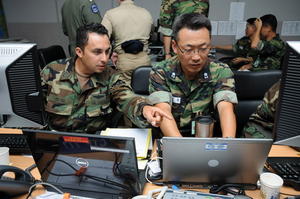CybersecurityNational Guardsmen, the new front line in cybersecurity
In an aggressive push to expand the military’s cyber warfare and defense capabilities, the National Guard has formed an increasing number of special cybersecurity units; National Guard cybertroops have proven to be particularly appealing solution, especially with defense cuts looming, as they cost less to train, maintain, and retain than active duty forces

National Guard units taking the lead in forming cybersercurity units // Source: dtmonline.com
In an aggressive push to expand the military’s cyber warfare and defense capabilities, the National Guard has formedan increasing number of special cybersecurity units.
Washington has shown itself to be particularly ahead of the curve with its 262nd Network Warfare Squadron, a unit consisting of 100 fully qualified Air National Guard troops with computer expertise. Drawing on the rich talent pool of Seattle, Washington, which is home to tech giants like Microsoft and Amazon, many of the members of the 262nd perform similar duties on their day jobs as they do for the military.
Working in conjunction with an intelligence squadron, several air support squadrons, an engineering squadron, a combat communications group, and other units, the 262nd detects, monitors, and defends against cyberthreats as well as traditional attacks.
“It makes us a very elegant solution for future warfighting requirements,” said Colonel Brian Dravis, the commander of the Washington Air National Guard’s 194th Regional Support Wing, which includes the 262nd.
The 262nd is unique in that they have been continuously tasked with a cyberdefense mission since 2002, while many other squadrons were only recently given the assignment starting last year as part of the Air Force and Navy’s growing efforts to prepare for non-traditional warfare.
National Guard cybertroops have proven to be particularly appealing solution, especially with defense cuts looming, as they cost less to train, maintain, and retain than active duty forces. Aside from Washington, the National Guard in other states like Maryland, Delaware, Utah, and Rhode Island have also set up cyber units.
In recent years, the military has become increasingly keen on bolstering its cyber capabilities as foreign hackers often with the backing of their governments have proven increasingly adept at infiltrating U.S. military networks to steal information.
For instance in 2008 Pentagon officials discovered Agent.btz, a computer virus that had tunneled deep into a classified military network and even spread to other networks collecting sensitive information and transmitting it back to an unknown source along the way.
At the time Pentagon officials called it “the most serious breach of the U.S. military’s classified computer systems.”
Meanwhile the Stuxnet worm, which took control of the industrial control system at Iran’s Bushehr nuclear facility and caused physical damage, proved that cybersecurity threats are no longer restricted to digital networks.
“It’s how to fight the next war,” said Colonel Steve Hilsdon, the commander of Washington National Guard’s 252nd Combat Communications Group, which includes the 262nd.
